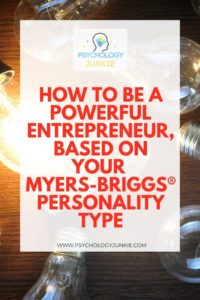How You Can Be a Powerful Entrepreneur – Based on Your Myers-Briggs® Personality Type
Have you ever wanted to start your own business? Does the idea of creating something new and all-your-own inspire you and motivate you? As someone who grew up with an entrepreneur for a father and who is now an entrepreneur myself, I can tell you that ANY type can start their own business. I’ve read articles that say that only certain types are “cut out” for entrepreneurship, and that’s always bugged me. One thing that personality type should NEVER be used for is to put limits on people. I’ve heard of (and met) successful entrepreneurs of all types. Dedication, hard work, and commitment are qualities that ANY type can have and these are some of the most important qualities needed to venture into the entrepreneurial world.
This article is going to cover some of the unique gifts and strengths that each Myers-Briggs® personality type brings to the table when starting their own business. Because this article is going to address all 16 types, I can’t go into a TON of depth, or this wouldn’t be an article, it would be a book! That said, I hope to write individual articles for each type in the future that will go into more depth and provide even more tips and information.

Not sure what your personality type is? Take our new personality questionnaire here. Or you can take the official MBTI® here.
How Each Myers-Briggs® Type Can Be a Powerful Entrepreneur
The ISTJ Entrepreneur – Researcher and Conserver
“You can do so much in 10 minutes time. Ten minutes, once gone, are gone for good. Divide your life into 10-minute units and sacrifice as few of them as possible in meaningless activity.”
– Ingvar Kamprad, founder of IKEA, and rumored ISTJ
ISTJ entrepreneurs are known for their time-management skills, their attention to detail, and their methodical, focused determination. When ISTJs are committed to an idea, almost nothing can shake them. When it comes to starting a business they proceed with caution but resolve. They are hard workers with attention to quality and reliability that makes them trusted by their investors, customers, and employees alike. Whatever they’re doing, they do so with orderliness and commitment.
ISTJ entrepreneurs are excellent at coming up with a structure for their business and putting out quality products, information, or communications. They start their business with a detailed plan of action, and move step-by-step through their list of goals, only checking them off after they have met their highest standards.
ISTJs are excellent at researching products, trends, and quality. They take their time to focus in on their target market and find out what’s needed and desired. They look for the best materials possible and experiment personally with their message and product so that they can be honest and create something they truly believe in through their own use.
When it comes to deadlines, ISTJs are on top of things. They are extremely reliable and responsible and if they say they’re going to have a product created by a certain date, you can bet that it will be there.
According to the MBTI® Manual, ISTJs are overrepresented among working MBA students compared with a national sample. They are also overrepresented among both male and female small business owners! This should be a good sign to any ISTJs here who are interested in creating their own businesses.
Some Tips for ISTJ Entrepreneurs:
– Try new things and innovative approaches, even if it can make you uncomfortable!
– Create a ‘safety net’ before you start your business. Having a solid contingency plan can free you from anxiety and holding back.
– Don’t be too cautious! Being an entrepreneur can be scary and it involves some strategic risk-taking. Don’t let the fear of failure keep you from taking the next step!
– Don’t completely avoid networking. Your hard work, attention to detail, and focused nature will inspire other people. Finding the right connections, while it can be daunting or uncomfortable, can really help you find the partners, employees, or mentors you need!
– Express enthusiasm for your business and be aggressive about marketing your idea or product! It’s in your nature to be private and contained, but when it comes to your business, you’ll have to let loose a little bit. Demonstrate confidence in yourself, and if public speaking irks you, try writing out your ideas. Blog, post on social media, or create graphics that showcase what your business offers the world! This allows you to be enthusiastic behind the scenes without having to get right up in people’s faces.
The ISFJ Entrepreneur – The Executive and Humanitarian
“We ought to do good to others as simply as a horse runs, or a bee makes honey, or a vine bears grapes season after season without thinking of the grapes it has borne.”
– Marcus Aurelius, Roman Philosopher and emperor and rumored ISFJ
ISFJs think of entrepreneurship not just as a way to make money, but as a way to improve their communities and the lives of others. They are usually interested in having some personal impact with their career and meeting an unmet need of clients and customers. ISFJ entrepreneurs are excellent at researching, collecting relevant facts, and creating a plan of action that is structured and detailed. They take every decision they make seriously, thoughtfully considering how it will impact everyone involved, and considering the practical applications and use of their idea.
When it comes to work-ethic, ISFJs truly shine. They tend to be solid, stable, and dependable as well as thorough, focused, and methodical. They will make a list of goals and check them off only after they’ve reached their notoriously high standards.
When it comes to approaching investors and consumers, ISFJs have excellent people skills. They are usually highly attuned to what people want to hear and the needs people have. They try to market their products in a way that connects with their customers on an emotional level and they try to anticipate the needs or concerns of investors before they go into a meeting. They are usually security-conscious and cautious, so they will anticipate for worries or concerns their consumer or investor might have ahead of time.
According to the MBTI® Manual, ISFJs are overrepresented among working MBA students compared with a national sample. They are also overrepresented among male small business owners!
Some Tips for ISFJ Entrepreneurs:
– Stay open to new possibilities. As an ISFJ, you’re skilled at using personal experience and past data to create plans of action. New, untested approaches can be scary or uncomfortable for you to consider. But innovating is part of entrepreneurship, so make a list of your ideas (or the ideas of others) and sometimes when you’re de-stressed go through the list and ask yourself if it would really hurt anything to try some of the better ideas.
– Don’t be afraid to be assertive! Market yourself aggressively and don’t be afraid to toot your own horn! ISFJs tend to be modest people, but in the world of business and marketing, you want to appear confident. Believe in yourself and your hard work and let that show! It may feel odd or unnatural at first, but it will get easier over time.
– Don’t let rejection or failure crush you. As an entrepreneur, there will inevitably be times of failure or rejection. Whether it’s a bad review by a disgruntled customer, an investor who doesn’t believe in your idea, or even a family member who wants you to conform to a 9-5 lifestyle. Try to separate yourself from the criticism and remember that ultimately it’s your life and your dream and everyone fails or faces rejection at some point. All the greatest entrepreneurs have had moments of failure.
– Don’t get too caught up in the details. You are detail-oriented and that’s a definite plus in your work environment. That said, sometimes you can get bogged down in the details and lose sight of the big picture. Take breathers throughout the day to re-assess your ultimate goals and whether the details you’re working on now will greatly impact those.
The ESTJ Entrepreneur – The Down-to-earth Director
“The ultimate goal is to be an interesting, useful, wholesome person. If you’re successful on top of that, then you’re way ahead of everybody.”
– Martha Stewart, Business magnate and rumored ESTJ
ESTJ entrepreneurs are known for being confident, assertive, organized, and practical. They have strong leadership skills and are decisive and hard-working. They’re not likely to procrastinate on decisions or dilly dally or put things off. Getting things done quickly and efficiently is a driving force in their life.
ESTJs are skilled at coming up with a plan, an outline, and a structure, and sticking to it at all costs. They are usually good at organizing people and employees, finding ways to utilize resources efficiently and reach goals effectively. They have high standards, not just of others, but of themselves. They tend to be very responsible and stable, looking out for the security and needs of their business and its employees.
ESTJs are good at looking at the facts and objective data and seeing pain points that their business can solve. They have strong critical thinking skills and utilize these to eliminate options or ideas that don’t seem realistic or practical.
When it comes to dealing with investors and customers, ESTJs appear confident and knowledgeable. They are very thorough in their research and have a down-to-earth, realistic mentality that establishes trust with people who might seem unsure or worried about investing. ESTJs will have dotted their I’s and crossed their t’s, and they will have plenty of facts and evidence to back up their claims and goals as business owners.
As extroverts, ESTJs make excellent networkers; they enjoy interacting with people, forming connections, and finding relationships that will be useful in the future. They usually develop a wide circle of connections and useful friendships and they are usually good at team building as well.
According to the MBTI® Manual, ESTJs are overrepresented among working MBA students compared with a national sample. They are also overrepresented among male and female small business owners.
Some Tips for ESTJ Entrepreneurs:
– Don’t decide too quickly or be too impatient! ESTJs love to decide and they tend to dislike “mulling things over”. This can be a good thing, but it can also mean you decide too quickly without looking at all the data. Take a few moments to analyze the facts you have on hand so you can make better decisions. If you have trustworthy advisors, go to them for their opinions as well.
– Don’t be afraid to innovate! Trying untested, new, unusual ideas can be scary sometimes. As a Si-user, you prefer to work with tried-and-true techniques, but in the world of entrepreneurship, taking risks and working with untested approaches is part of the game. Sometime when you’re calm and relaxed, take a moment to brainstorm either alone or with a trusted mentor. See what ingenious ideas you can find!
– Keep your eye on the big picture. You’re good with details; you’re good at being focused and making sure everything is done right. That said, it’s important to step back sometimes and look far ahead to your end goal. Could some of the small details be put aside to get a more important “big picture” project done?
– Consider the emotions of the people you work with. When you’re talking to investors or employees, what do you think their inner needs are? What sort of problem or pain are they dealing with that you can solve? Listen with empathy, speak with compassion, and try to connect in a personal way.
– Don’t micro-manage. You have a strong idea of how you want things done, but sometimes it’s important to step back and let other people do things their own way. Their approach may be different or unusual, but it may also be just what your company needs!
The ESFJ Entrepreneur – The Nurturing Leader
“Outstanding leaders go out of their way to boost the self-esteem of their personnel. If people believe in themselves, it’s amazing what they can accomplish.”
– Sam Walton, Founder of Wal-Mart and rumored ESFJ
ESFJs are usually compassionate, enthusiastic entrepreneurs who take good care of their team and are tuned into the needs and desires of their customers. They are good at creating a community, so social media marketing, networking, and connecting with customers is an area where they truly shine. Pair this with their hard-working, detail-oriented nature and you’ve got a recipe for success as an entrepreneur.
Because ESFJs possess strong interpersonal and communication skills, they tend to do well in public relations, marketing, networking, and selling their idea to investors. They are skilled at coordinating projects and making their investors and consumers feel heard and seen. They have a knack for establishing rapport and boosting confidence and a sense of companionship.
ESFJ entrepreneurs are organized and planful. They are good at creating a timetable and budget for their business, and they’re also good at researching effective strategies. They will look for leaders in their fields and take courses, read books, and research to gather as much information as possible. Their strong sense of organization and attention to detail keeps them producing quality content and products.
ESFJs usually have an eye for detail and aesthetic beauty. When it comes to branding and product presentation they are usually careful and particular. They also usually know how to dress appropriately and present themselves professionally.
Lastly, ESFJs are good team players. They’re good at making everyone feel included, at giving everyone a chance to voice their opinions, and building a community that’s filled with harmony.
Some Tips for ESFJ Entrepreneurs:
– Gather objective criteria when you make decisions. As a feeling type, you tend to make decisions based on the needs of people and the values you have. That’s important. But as a business owner, you’ll need to prioritize looking at the objective facts, pros and cons, and most logical conclusions. You may have to do things which cause you to stress; firing people, disagreeing with someone you care about or being more impersonal than you’d like to be. Because this tends to be stressful, be sure you have a good support network to help you out during these times! Have a trusted friend or family member that you can vent to when you have to make tough decisions or let someone down.
– Keep an eye on the big picture. You’re good at seeing the details and taking care of immediate needs. The only problem is sometimes you can get too focused on the details and lose sight of the end goal. Take regular pauses and breathers to envision your long-term goals and see if the projects you’re working on now align with those. Don’t get so caught up in the nitty-gritty that you miss out on big opportunities!
– Don’t get discouraged when you face rejection or failure! As an entrepreneur, there will inevitably be times of failure or rejection. Whether it’s a bad review by an angry customer, an investor who doesn’t believe in your dream, or even a family member who wants you to conform to a more traditional career path. Try to separate yourself from the criticism and remember that ultimately it’s your life and your decision and everyone fails or faces rejection at some point. All the greatest entrepreneurs have had moments of failure. You’re not alone!
– Don’t be afraid to be aggressive! As an ESFJ you tend to be better at promoting others than yourself! You may avoid raising your rates to sidestep disappointing your customers or you may feel uncomfortable listing your achievements. Learn to recognize when you’re making a decision that could be negative for your business just so you can avoid a potentially uncomfortable experience! Learn to self-soothe when you’re worried about negativity or bad feedback.
The ISTP Entrepreneur – The Independent Analyst
“Expect the unexpected. And whenever possible, be the unexpected.”
Jack Dorsey, Founder of Twitter, and rumored ISTP
ISTPs combine a logical, objective focus with a risk-taking, adventurous personality to succeed. They are extremely resourceful, easily seeing what they have and using it in the most efficient way possible. They are the MacGyver’s of the entrepreneurial world, finding unique and innovative solutions and tools to solve problems. They are very capable of picking up technical knowledge, seeing logical principles and finding ways to troubleshoot even the most complex problems.
ISTPs are well-suited to entrepreneurial work because they don’t panic in a crisis. They tend to work well in chaotic situations where they have to put their problem-solving skills to the test and keep a steady head. This is especially true when a practical or technical solution is needed. They also appreciate the independence afforded by entrepreneurship. For once, they can make their own rules and let go of some of the bureaucratic red tape that they find so stifling in the corporate world. ISTPs tend to do well when they create a business that coincides with their interest; if they’re a gamer, for example, creating a blog about gaming or developing a new game.
ISTPs have a skill for adapting to ever-changing circumstances, and this serves them well in the business world. This is especially true as they reach mid-life and tap into their tertiary intuition. They suddenly are not only adaptable but able to tune into long-range predictions to find strategic, far-reaching solutions. ISTPs are risk-takers and find a thrill in the challenges and “gambling” nature of entrepreneurship. They have the stamina for venturing out on their own that many other types struggle with.
Some Tips for ISTP Entrepreneurs:
– Don’t give up on networking! ISTPs notoriously dislike networking, but it’s one of the important parts of starting a business and making the necessary connections. Keep in mind, with the world becoming more and more digital you can do a lot of your networking online! You may not always have to leave the comfort of your own home.
– Keep an eye on the big picture. If things are going terribly right at the moment don’t give up! Almost all successful entrepreneurs fail once or twice along the way. If everything is more work than you anticipated, try to keep an eye on your future goals and stay determined and focused.
– Don’t put off decisions for too long! In your effort to see all the options and consider all the facts, you may struggle with indecision and distractions. Try to set deadlines for yourself for decision-making or create a network of people who you trust who can help you with decisions.
– Tap into your inferior function. You don’t want to over-focus on extraverted feeling, but when it comes to selling your idea, networking, and connecting with investors and consumers, you’ll want to tap into empathy and relationship-building. No matter who you’re working with, try to take a little time each day to work on asking questions like “how can I help?”, “what are your needs”, and tune into the wants/desires of your target market.
The ISFP Entrepreneur – The Practical Dreamer
“It’s easy to think that craft can’t change but important to remember that all craft process was at some point new, at some point challenged convention – not to be contrary, but enabled by some breakthrough, some newly discovered principle, or sometimes some wonderful accident.”
– Jonathan Ive, Lead designer at Apple and rumored ISFP
ISFPs make sensitive, conscientious leaders who put real heart and sincerity into their work. They don’t apply themselves to a business plan unless their values are involved, so it’s essential that they are involved in a business that stirs their passion and is in line with their desires and interests. They are excellent listeners and usually make very likable employers. They are good at keeping an eye on trends, being aware of what consumers are looking for, and listening carefully to experts in the field to gain wisdom and input.
The adaptable, adventurous nature of entrepreneurship is often appealing to ISFPs. The risks might scare them at times, but they like knowing they aren’t stuck in the same 9-5 grind day after day for the rest of their lives. They like being allowed to follow their impulses and curiosity to create a stronger brand and experiment with new business ideas. They also like the creative freedom and independence that entrepreneurship provides. They are usually skilled with branding, connecting with consumers, and presenting themselves professionally.
Even though ISFPs are introverts they tend to do well with targeted networking, especially online. They are good at tapping into the emotional desires of other people and figuring out what they need or want. While in-person gatherings can be intimidating for them sometimes, they usually do an excellent job of presenting themselves, listening, and making a positive impression.
Some Tips for ISFP Entrepreneurs:
Look for unusual options that might not be obvious. – Engage in some brainstorming sessions with your team or trusted advisors so that you can see options that might not be readily apparent. As an ISFP you’re excellent at working with what you have right now, but what is it that you don’t have? What opportunities might you be missing? What projects are important but not in your line of vision? Keep all these things in mind.
Prioritize your activities and don’t burn out! As an ISFP you like to mix work with play and you like to stay active. Figure out what activities and projects are the most important for you to complete in a day, but give yourself regular breaks in between to get up and stretch, take a walk, listen to a song, etc,. If you’re sitting at a desk all day, you might burn out and then lose motivation.
Be objective in your decisions. As an ISFP, you tend to make decisions based on your values and the impact those decisions will have on yourself or others. But when it comes to business it’s important to stay objective and have some healthy skepticism and impersonal logical analysis. You can be very skilled at doing this if you’re not over-doing it, so if this is something you’re struggling with, see if you can find a trusted partner or friend who can help you with these decisions (preferably someone with a preference for thinking!).
Don’t get discouraged when you face rejection or failure! As an entrepreneur, there will inevitably be times of failure or rejection. Whether it’s a bad review by an angry customer, an investor who doesn’t believe in your dream, or even a family member who wants you to conform to a more traditional career path. Try to separate yourself from the criticism and remember that ultimately it’s your life and your decision and everyone fails or faces rejection at some point. All the greatest entrepreneurs have had moments of failure. You’re not alone!
The ESTP Entrepreneur – The Tactical Risk-Taker
“Restlessness is discontent – and discontent is the first necessity of progress. Show me a thoroughly satisfied man, and I will show you a failure.”
– Thomas Edison, Inventor, Businessman, and a rumored ESTP
With their keen powers of observation, their ability to take smart risks, and their strong sense of logic, ESTPs are natural entrepreneurs. They are drawn to entrepreneurship more than many types because they love the personal freedom and lack of restrictions and bureaucratic rules. They love being their own bosses, landing important business deals, and taking scary but exciting risks. They are good at networking, negotiating, and staying objective and practical.
ESTPs have a natural charm, energy, and charisma that makes them excellent at networking and convincing. They are good at selling their idea, their dream, and their product while establishing rapport with others and generating excitement about what they have to offer. They are usually excellent salespeople and this is a vital quality to have as an entrepreneur.
ESTPs are highly energetic individuals who aren’t daunted by the unpredictability and intimidation of entrepreneurship. When things are chaotic, when conflict enters the picture, or when risks need to be taken, ESTPs are good at keeping a steady head and staying optimistic. They like the roller-coaster nature of creating a business, and they won’t give up or scare away easily!
Resourcefulness is another area where ESTPs thrive. They are good at working with what they have (associates, friends, tools, technology) to create opportunities and solve problems. They know how to move quickly and act with limited resources to make things work. The bootstrapping phase of startup life is a time period where their natural resourcefulness is effectively used.
Some Tips for ESTP Entrepreneurs:
– Don’t avoid making a long-range plan. As an ESTP you are skilled at living in the moment, and that’s a good thing, but don’t forget to keep an eye on the big picture! Make a long-range business plan, enlist help if you need to, and take some time thinking about your direction and the steps needed to get there before you jump right into things.
– Don’t let boredom stop you from doing admin work. Some nitty-gritty admin work is necessary for any job, and while it’s frustrating and seems trivial, your whole idea can fall apart if it doesn’t get done. Take a little time each day to tackle the admin side of things or else hire someone else who can keep tabs on this with you!
– Be punctual and follow-through on commitments. I read a lot about how ESTPs struggle with punctuality. While I don’t think this is always the case (I’m married to an ESTP and he’s the most punctual person I know!) I do know it can be a struggle for some. Remember that you can ruin a business deal or an important relationship by being late or forgetting a commitment.
The ESFP Entrepreneur – The Engaging Activist
“When I do something, it’s all about self-discovery. I want to learn and discover my own limits.”
– Larry Ellison, Founder of Oracle and rumored ESFP
When it comes to the enthusiasm, adaptability, and charisma needed for starting a business, ESFPs have this in spades. These types are excellent at jumping on opportunities, utilizing available resources, and connecting with people and getting them excited about their business idea. They are skilled at learning on-the-job, gathering facts and details and responding to current dilemmas. They are also amazing networkers who use their engaging personality, their love of fun, and their sincerity to connect with people and get them invested in whatever product or service they’re creating.
ESFPs are good at multi-tasking and juggling multiple projects and ideas which gives them a heads up in the business arena. They are good at keeping a lot of balls in the air and maintaining composure and enthusiasm at the same time! This is appealing to co-workers, employees, and potential investors who like to know that the person they’re teaming up with can handle a crisis. Howard Schultz, CEO of Starbucks, and a rumored ESFP exhibits this quality well:
“Entrepreneurs must love what they do to such a degree that doing it is worth sacrifice and, at times, pain. But doing anything else, we think, would be unimaginable.”
– Howard Schultz
ESFPs tend to have a natural aesthetic taste which they use to design their brand and create a winning company image. Not only this, they’re good at tapping into the needs of their consumers and connecting with them on an emotional level. It’s not enough for them to be successful, they want to be sincere, inspire people, and benefit their entire team.
Some Tips for ESFP Entrepreneurs:
– Take time to create a long-term plan. Spend some time reflecting on where you’ve been, the wisdom you’ve gained, and where you want to go. Figure out what your needs are, who you can use as a mentor, and what your measurable goals will be. As an ESFP you’re very good at living in the moment and taking advantage of current opportunities, but you always want to keep the big picture in your line of vision.
– Brainstorm new possibilities. You’re a very resourceful person and you’re good at using tools already at your disposal. Try to generate a list of possibilities that might include some innovative, outside-the-box ideas. Don’t be afraid if your ideas sound a little crazy or unrealistic! Just write them all down, and then look them over and ask yourself which ideas would benefit your long-term plan.
– Be objective in your decisions. As an ESFP, you tend to make decisions based on your values and the impact those decisions will have on yourself or others. But when it comes to business it’s important to stay objective and use a healthy dose of critical thinking. If this is something you’re struggling with, see if you can find a trusted partner or friend who can help you with these decisions (preferably someone with a preference for thinking!).
Don’t get discouraged when you face rejection or failure! As an entrepreneur, there will inevitably be times of failure or rejection. Whether it’s a disgruntled customer, an investor who doesn’t believe in your dream, or even a family member who wants you to conform to a more traditional career path. Try to separate yourself from the criticism and remember that ultimately it’s your life and your decision and everyone fails or faces rejection at some point. All the greatest entrepreneurs have had moments of failure. Remember that you’re not alone!
The INTJ Entrepreneur – The Strategic Visionary
“The biggest risk is not taking any risk…In a world that is changing really quickly, the only strategy that is guaranteed to fail is not taking risks.”
– Mark Zuckerberg, CEO of Facebook and rumored INTJ
When it comes to creating original, innovative solutions and strategies, look no further than the INTJ! These entrepreneurs have perseverance, determination, and originality flowing through every inch of their being. When they start a business they create a strong, long-term plan, they focus on efficiency, organization, and ensuring that deadlines are met on time. They are also good at coming up with ideas that are entirely unique and one-of-a-kind. They like to pioneer new pathways rather than follow or imitate other people’s ideas. When it comes to working with employees, INTJs are focused on fairness and competence. They may not be the most “warm and fuzzy” employers, but they also won’t show preferential treatment or disingenuous behavior.
INTJs have a knack for anticipating future trends. They notice patterns and forecast needs that will arise in 10 or 20 years, which means that they are often ahead of their competition and solving problems before they’ve even begun. They are also good at synthesizing information, taking lots of random data, and material to see weaknesses and strengths in a market or industry. When they decide to move forward with an idea, you can be sure they’ve spent a lot of time looking at various perspectives, weighing the pros and cons, and considering the long-term strengths and implications of their dream.
Because INTJs are so independent, entrepreneurship is naturally appealing to them. They like the idea of setting their own goals, being in charge of their own time, and not being under the thumb of someone else. They also like the innovation and originality that they’re afforded.
Some Tips for INTJ Entrepreneurs:
– Don’t forget the little details. As an INTJ you try to keep your focus on the big picture, but unfortunately, those little details can also be important. If you can afford it, hire an employee to manage the details and repetitive tasks, but if not, make sure you’re scheduling out some time to get through the nitty-gritty little stuff involved in running a business.
– Don’t be afraid of diplomacy. As an INTJ you tend to have a very determined, self-assured confidence. While this can be a good thing, it’s also important to be able to connect and empathize with your consumers and your investors. When you make a decision, take a few moments to consider the personal impact and value of the decision. Make sure you’re not appearing condescending or arrogant in your interactions. This is especially important if you’re doing all the product marketing yourself.
– Keep an open mind. If you’re growing a business, you’ll inevitably have to work with other people who each will have different ideas and opinions. Try to be willing to hear people out, brainstorm, and give everything a second look. You’re a naturally decisive person and you usually have very good ideas, but being open to other points of view is always beneficial.
The INFJ Entrepreneur – The Empathetic Imagineer
“If you are successful, it is because somewhere, sometime, someone gave you a life or an idea that started you in the right direction. Remember also that you are indebted to life until you help some less fortunate person, just as you were helped.”
– Melinda Gates, Co-Founder of the Bill and Melinda Gates Foundation, and a rumored INFJ
For the INFJ, the entrepreneurial dream isn’t just about making money, it’s about freedom, independence, and seeing their unique vision and values brought to life. They want to do something that will benefit people in some way. They want to produce something they really believe in and can promote without feeling gimmicky or insincere. As independent individuals, INFJs are drawn to the autonomy that entrepreneurial work provides. They enjoy being able to chase their original ideas, innovate, be creative, and not have to answer to other people’s whims.
When it comes to long-range forecasting, INFJs (and INTJs) are some of the best. They are excellent at plotting out a strategic way to reach their vision and make it a reality. They take their time to create a business plan and look at many different perspectives and angles. They don’t rush the process but take their time to make sure they’re on the right track. They can be perfectionists in this area and may even take a little too long to take action sometimes.
When it comes to networking and connecting with people, INFJs are skilled at establishing rapport and improving confidence in their brand. As introverts, they do crave their alone time, but with time and practice, they are usually extremely capable at marketing themselves, their idea, and establishing loyal connections. They are highly attuned to the deeper emotional needs and desires of others and this ability gives them a leg up when it comes to writing effective copy, marketing effectively, or deeply connecting with their clients or consumers.
INFJs are good at anticipating trends and forecasting potential pain points their business can solve. They come up with creative solutions to obstacles far ahead of when those obstacles may actually happen. They are good at foreseeing weaknesses and strengths in potential employees and team members and they are good at inspiring others to meet their dreams and contribute in their own one-of-a-kind ways.
Some Tips for INFJ Entrepreneurs:
– Don’t forget the facts and details – As an INFJ you are nearly always focused on the big picture. While this is important and definitely a strength in the business world, forgetting the nitty-gritty details and the practical problems and facts can be a major stumbling block. Schedule time out of your day to check off the details that you tend to dislike or avoid.
– Stay objective in decision making. As a feeling type, it’s a lot more natural for you to make decisions based on your values or the needs of people. However, in the business world, critical thinking and tough decisions are part of the game. You might have to fire someone who’s under-performing or you might have to raise prices on a product. When things get tough in this regard, try to have a support person you can talk to, whether it’s a friend or family member. This way you can get the encouragement, balanced perspective, and strength you need to keep going.
– Don’t procrastinate too much. As a type with a dominant perceiving function (introverted Intuition), it’s easy to get stuck in analysis/perspective-shifting mode. Try to set measurable, attainable goals and meet them daily. Remember that every hour can push you towards greater progress. You need your alone time to think and imagine, but you also need to act to get all those ideas out of your brain and do something with them!
– Don’t get discouraged when you face rejection or failure! As an entrepreneur, there will inevitably be times where an idea flops or someone gets angry with you. Whether it’s an unhappy customer, a friend who doesn’t believe in your dream, or even a family member who wants you to conform to a more traditional career path. Try to separate yourself from the criticism and remember that everyone fails or faces rejection at some point. All the greatest entrepreneurs have had moments of failure. Remember that you’re not alone!
Want a comprehensive guide to the INFJ personality type? Check out my eBook, The INFJ – Understanding the Mystic.
The ENTJ Entrepreneur – The Dauntless Director
“Good business leaders create a vision, articulate the vision, passionately own the vision, and relentlessly drive it to completion.”
– Jack Welch, CEO of General Electric and rumored ENTJ
ENTJ entrepreneurs are known for their ability to develop effective strategies, anticipate trends, create original visionary ideas and find creative solutions to problems. Due to their dominant Extraverted Thinking (Te), ENTJs know how to make strong, objective decisions and organize a team to meet goals effectively. They are confident and determined leaders who prefer to be their own bosses rather than employees. Entrepreneurship entices the ENTJ because they naturally like a challenge and they like the independence afforded with it.
One of the qualities that help ENTJs succeed in business is their ability to see obstacles as challenges rather than roadblocks. They use their intuition and strong thinking skills to come up with innovative strategies to solve problems and even anticipate them long before they occur so they can be avoided. They are also quick to pick up on patterns and trends and keep an eye on what the future holds. They are constantly updating their business plan and their strategy to keep up with the times and be one step ahead of the game.
As intuitives, ENTJs keep a constant eye on the future and the big picture. They are good at coming up with long-range plans and implementing them and leading a team of employees along the way. They are also quick to grasp technological changes and implement them in their business. When it comes to people, they have high expectations and standards, but they will usually work harder than anyone else involved.
ENTJs are usually skilled at networking. They are often outgoing and almost always confident. Their visionary approach, quick, logical thinking, and determination is inspiring to investors, employees, and potential customers.
Some Tips for ENTJ Entrepreneurs:
– Don’t rush to make decisions. As a dominant Extraverted Thinking type, you tend to dislike mulling things over. In fact, ENTJs can experience a “flow” state simply from the process of deciding! Be sure to reflect before acting, look at different perspectives and angles to make sure you’re making the best decision. Talk to a team of advisors or people you trust to get their opinion.
– When dealing with people, diplomacy is essential. You have energy, drive, and confidence, but this can make you appear arrogant or pushy sometimes. Take time to establish rapport, find common ground, and tune into the other person’s needs. Listen carefully when people are talking, even if you think you know what they’re going to say. Be patient with other people’s decision-making process. This will help you in dealing with employees, customers, and potential investors.
– Be patient with the nitty-gritty details. I know that the little details are maddening sometimes, especially to someone like you who has such a big-picture vision and wants to get on with it. But don’t overlook all the little practical considerations that need to be attended to. If possible, hire someone who can keep up with those so you can do what you do best!
The ENFJ Entrepreneur – The Motivating Mogul
“Leadership is about making others better as a result of your presence and making sure that impact lasts in your absence.”
– Sheryl Sandberg, Executive at Facebook and rumored ENFJ
If you’re looking for an entrepreneur with charisma, communication skills, and extraordinary vision, ENFJs are true masters. They are enthusiastic about their dream, organized in seeing it through and effective at building a team to help them achieve their goals. One of their greatest strengths is their ability to build rapport and excitement with potential customers and investors. They know how to see emotional needs and pain points and solve them with original ideas and plans.
As intuitives, ENFJs are excellent at seeing the big picture and coming up with a long-range plan. As judging types, they are usually decisive and ready to act. They’re not the types to start projects and leave them unfinished; once they decide on something they are committed to their idea and determined to see it through. They show this same commitment to their employees and business partners. They are determined to make sure everyone’s opinions are heard and everyone has a voice in the company.
When it comes to networking, ENFJs are excellent at tuning into the needs and desires of people and making strong connections. Their friendliness, vision, and work ethic inspires confidence in potential investors and also makes them skilled in fields like marketing and social media promotion. ENFJs are also good at following through on courtesies; sending thank you notes to customers, checking in to make sure everyone is doing well, and keeping up with the needs of their employees. They are extremely concerned with maintaining harmony in their work environment.
Some Tips for ENFJ Entrepreneurs:
Don’t let your feelings cloud your decision-making process. As an extraverted feeling type, you care greatly about how decisions will impact other people. As a result, making tough, critical decisions can be a major stressor for you. Whether it’s firing someone who’s not working out, raising the price on a product, or responding to negative feedback, it’s important to be able to think objectively and have the emotional stamina to get through. Try to make sure you have a trusted friend, work partner, or family member you can vent to after days where you’ve had to make tough decisions. If possible, hire someone who can help you with some of the more impersonal decisions.
Collect all the necessary details. As an intuitive, you like to focus primarily on the big picture. Nitty-gritty details and facts can seem tedious to take into consideration, but it’s important to keep track of the realities. Ask plenty of questions when you’re given information and keep track of all the moving parts of your company so that major mistakes don’t occur.
Take time to consider your intuition. Sometimes ENFJs (and all EJ types) can get in the habit of deciding too quickly or moving into action before reflecting. It’s important to tap into your auxiliary intuition before you make a decision and take time to think about whether that decision lines up with your vision, your strategy, and your long-term goals. You also want to make sure you have the right details and facts to make the best decision. Sometimes having a sensing work partner or confidante you can talk to is good because they can bring up relevant facts and details you might have missed.
Don’t get discouraged when you face rejection or failure! As an entrepreneur, there will inevitably be times where an idea flops or you face roadblocks or criticism. Whether it’s an unhappy customer, a friend who doesn’t believe in your vision, or even a family member who wants you to conform to a more traditional career path. Try to separate yourself from the criticism and remember that everyone fails or deals with rejection at some point. All the greatest entrepreneurs have had moments of failure. Remember that you’re not alone!
The INTP Entrepreneur – The Intellectual Enterpriser
“Obviously everyone wants to be successful, but I want to be looked back on as being very innovative, very trusted and ethical and ultimately making a big difference in the world.”
– Sergey Brin, Founder of Google and rumored INTP
INTPs are extremely independent individuals and as a result, they are highly drawn to entrepreneurship. They are excited by the ability to create their own flexible environment, their own rules, and develop ingenious, out-of-the-box ideas. When it comes to innovation and dealing with challenges, INTPs truly shine. They are excellent problem-solvers and they use their extraverted intuition (Ne) to brainstorm unusual solutions to the most complex problems. As their business grows and they’re able to gain employees, the love being able to create ingenious ideas and then have people on their team help implement and create them.
Possibilities excite INTPs, and they love the way entrepreneurship gives them the open-ended opportunity to grow and develop and progress in their own way at their own timeline. They don’t like the limits of a 9-5 job where there’s a set pay rate and most of what they can accomplish is already prescribed and written down. There’s a boundless wealth of ideas and personal freedom that comes from entrepreneurship and this is highly appealing to them.
INTPs are excellent at making objective, logical decisions for their business. They are good at seeing the potential consequences of actions and avoiding problems that could potentially hurt their business. They’re also good at dealing with technology and being up-to-date on the newest advances so they can keep their business ahead of the game and relevant for their consumers.
INTPs generally offer a good amount of creative freedom to their team. They aren’t micro-managers and they enjoy seeing the unique ideas their employees come up with. This can be very motivating to everyone involved.
Some Tips for INTP Entrepreneurs:
Don’t get stuck in analysis mode. As an INTP you have a definite gift for analyzing and strategizing, but sometimes the desire to stay in this mode can cause you to miss opportunities where acting is necessary. Create some measurable goals and tasks that you want to complete by certain dates and make sure you’re matching your thinking with “doing”.
Don’t ignore networking or interacting with employees. I know networking is often a nightmare for introverts, but it can be extremely beneficial as an entrepreneur. Thankfully in the world we live in now, a lot of networking can be done online from the comfort of your own home. Connecting with potential clients, investors, and influencers can really help you to get ahead in business.
Don’t lose sight of the practical details. As an intuitive, you like to focus primarily on the big picture. Nitty-gritty details can seem tedious to take into consideration, but it’s important to keep track of the realities and small odd jobs that are necessary to keep a business running. Ask plenty of questions when you’re given information and keep track of all the moving parts of your company so that major mistakes don’t occur. If possible, hiring an employee to help with this can be a major help.
The INFP Entrepreneur – The Determined Dreamer
“Intuition is the key to everything, in painting, filmmaking, business – everything. I think you could have an intellectual ability, but if you can sharpen your intuition, which they say is emotion and intellect joining together, then a knowingness occurs.”
– David Lynch, Filmmaker and rumored INFP
INFP entrepreneurs have the creativity, independence, and originality to make truly one-of-a-kind products and advances in the business world. They are drawn to the freedom and autonomy they can experience as entrepreneurs, and they love the opportunity to choose a business course that coincides with their passion and values. They put a lot of heart into their business and strive to run things in accordance with their values and personal beliefs. They are entrepreneurs of integrity, which is a rare thing to come across in the business world sometimes. Their sincerity and creativity make them intriguing to many potential partners, investors, and employees.
One of the strengths of the INFP entrepreneur is their ability to think outside the box and see possibilities that don’t presently exist. They are good at innovating and generating long lists of ideas – the hard part for them can be narrowing that list down and moving forward to completing their ideas.
When it comes to connecting with others, INFPs are often reserved but kind and empathetic. They are good at expressing themselves in writing, so social media marketing, blogging, and e-mailing are usually strengths that they have. They are determined and willing to practice networking, even if it makes them feel uncomfortable initially. One thing INFPs can’t be is fake or phony, so whatever message they convey will be steeped in authenticity. The trust they inspire in others gives them very loyal friends and work partners.
INFPs have a lot of commitment to their business dreams. When things get hard they’re willing to stick through it, even if they may need some extra alone time to gather their strength.
Some Tips for INFP Entrepreneurs:
Be realistic in your expectations. As an INFP it’s easy to get caught up in all the amazing ideas and possibilities of entrepreneurship, but sometimes the mundane work involved can be de-motivating. There will be times when it’s hard to make money or pay the bills, times when you spend your whole day attending to irritating details. Be prepared for the practical realities of entrepreneurship so that you don’t give up when, at times, the reality doesn’t meet the expectation.
Try not to take criticism personally. As an entrepreneur, you’ll suddenly find that a lot of people want to give “advice”. Some of this advice will be very constructive, and other people will just want you to conform to something more traditional. Try to sort out the good advice from the bad, and try not to take criticism personally. There are a lot of tough talkers in the business world and people can be harsh. Try to take any kind of criticism for whatever constructive benefit you can get from it, or else move on and learn to let it go. This can take some practice!
Tap into your critical thinking skills. While I don’t recommend tapping into your inferior function extensively because this can cause stress, when it comes to making decisions try to step outside of your feelings and look at the facts and logical consequences. You can be very good at this in business. Sometimes it helps to have some thinking friends to give you their input when you’re facing important decisions or are unsure what is the right choice to make. As an introverted feeling type, you are amazing at making decisions that coincide with your values and what’s important to you. Being objective and impersonal can be a little more stressful.
The ENTP Entrepreneur – The Innovator
“Your first projects aren’t the greatest things in the world, and they may have no money value, they may go nowhere, but that is how you learn – you put so much effort into making something right if it is for yourself.”
– Steve Wozniak, Co-Founder of Apple and rumored ENTP
When it comes to generating original, innovative ideas you can’t get much better than an ENTP! These entrepreneurs are masters at thinking outside the box, creating ingenious solutions to problems, and encouraging a team to be creative and resourceful. They love the excitement and flexibility that entrepreneurship provides, and they also love the chance to take risks and challenge themselves. An entrepreneurial life is full of risks and potential setbacks, but ENTPs rarely find this daunting.
ENTPs (and ENFPs) have a skill for finding solutions in the midst of chaos. They are good at brainstorming and working in high-energy environments to come up with quick and creative ideas that other types often miss. They are also good at networking and connecting with a wide variety of people to spot trends and tap into the needs and desires of their consumers and potential investors. They have a natural charm and charisma that makes them good at making deals and forming profitable connections. They inspire excitement in their clients and consumers and they have a knack for stimulating the imagination of their employees to come up with creative team projects.
As intuitives, ENTPs are good at foreseeing and analyzing long-range implications. They have a knack for anticipating consequences and coming up with ways to solve problems before they even occur. They keep a constant eye on the big picture and enjoy imagining all the future opportunities they’ll be able to experience in their work.
Some Tips for ENTP Entrepreneurs:
Avoid getting stuck in the “idea generation” mode for too long. As an ENTP you excel at creating new and innovative possibilities. The problem can be implementation and follow-through. When it comes down to the actual process of creating the idea and seeing it through to completion, sometimes you lose momentum and get distracted by another new and better idea. Try to stay focused and stick with your established priorities.
Avoid sabotaging yourself with procrastination. Procrastination isn’t always a bad thing. Sometimes putting off completing a project leaves you open for new inventive ideas. That said, promised deadlines and projects need to be finished or you can risk being seen as undependable by your investors and partners. Learn when it’s okay to procrastinate and when it’s not.
Don’t lose sight of the practical details. As an intuitive, you like to focus mainly on the big picture. Nitty-gritty details can seem boring and de-motivating. Either way, it’s important to keep track of the realities and small odd jobs that are necessary to keep a business running. Ask questions when you’re given information and keep track of all the moving parts of your company so that major mistakes don’t occur. If possible, hiring an employee to help with this can be a big help.
Have a Diverse Team of Mentors. Have a sensing friend? Ask them for advice when it comes to details and practical realities. Have a feeling friend? Ask their advice on how decisions might impact the people involved. Have a judging friend? Ask their advice on planning things out and organizing. You can do a lot of these things yourself from time to time, but having mentors with different strengths from your own can help you to make better decisions and have more balance.
The ENFP Entrepreneur – The Adventurous Inspirer
“What I love…is a sense of unlimited possibility, the sense that life could bring you anything, that around every corner could be something amazing.”
J.J. Abrams, Filmmaker and rumored ENFP
The enthusiasm and creativity that ENFPs bring to the entrepreneurial world is nothing short of astounding. These types have a visionary outlook on the future that sees endless possibilities and potential. They make inspiring leaders, motivational deal-makers, and sincere marketers. Everything about what they do has to be authentic and has to inspire hope in the future. ENFPs like a challenge, enjoy the flexibility and independence of entrepreneurship, and thrive when working with a variety of ideas and creative opportunities.
When it comes to networking, ENFPs are naturals. They know how to get people excited about their plan and they know how to empathize with them and connect with them on an emotional level. They’re all-around fun people to be with and so it’s usually not hard for them to bring in a team of enthusiastic partners, employees, and investors. Their natural charisma and confidence is impressive to others, and their long-range future thinking helps them to see possibilities and opportunities that aren’t readily apparent.
As ENFPs reach mid-life they are able to tap into their tertiary function, Extraverted Thinking (Te) quite a lot. This helps them when it comes to creating a structure and following through on their projects in a logical, systematic way. Until then this can be a struggle for them, but usually this becomes easier as they get older and their type matures more.
Some Tips for ENFP Entrepreneurs:
Be realistic and practical in your expectations. As an ENFP it’s easy to get caught up in all the amazing ideas and possibilities of entrepreneurship, but sometimes the mundane work involved can be boring or feel stifling. There will be times when it’s hard to make money or pay the bills, or days where you spend all your time attending to irritating details. Be prepared for the practical realities of entrepreneurship so that you don’t give up when reality doesn’t meet the expectation.
Try not to take criticism personally. As an entrepreneur, you’ll suddenly find that a lot of people want to give “advice”. Some of this advice will be smart and constructive, and other advice will be terrible. Some people will urge you to conform to a more “traditional” 9-5 lifestyle. Try to sort out the good advice from the bad, and try not to take criticism personally. There are a lot of tough talkers in the business world and they can be harsh. Try to take any kind of criticism for whatever constructive benefit you can get from it, or else move on and learn to let it go. This can take some practice!
Don’t sabotage yourself with procrastination. Procrastination isn’t always a negative thing. Sometimes taking your time on a project leaves you open for new inventive ideas. That said, promised deadlines and projects need to be finished or you can risk being seen as undependable. Learn when it’s okay to procrastinate and when it’s not. Sometimes it helps to have a TJ type on your team who can help you plan out efficient outlines and stay on track with goals.
What Are Your Thoughts?
Have you ventured into the entrepreneurial world? Do you have any tips for other entrepreneurs of your type? Let us know in the comments!
Find out more about your personality type in our eBook, Discovering You: Unlocking the Power of Personality Type.
Other Articles You Might Enjoy:
Are Certain Personality Types Smarter Than Others?
The Leadership Skills of Every Myers-Briggs® Personality Type
Discover Your Superpower – Based on Your Myers-Briggs® Personality Type
How to Communicate Effectively with Any Myers-Briggs® Personality Type
















I agree with your analysis of ENFP re entrepreneurship esp as a sole proprietor. I’m an artist so I’m very creative however I procrastinate, dislike routine /mundane, easily influenced. I know isolation is the cause of the previous “bad habits.” I can work alone around the clock on a painting or project but I lack balance. When I’m on a creative bender, I ignore “life.” Well-meaning people tell me what I “should” do not realizing that I KNOW that but when running a business takes up so much energy, I dry up inside. What I really need is help to balance my talent with someone else’s practical skills. During periods of my life when I had it, I was successful. Currently, I’m affiliated with an organization as teaching artist for the disabled. I do great because tho there are reports, records & accountability, I have freedom of expression, flexibility plus support. Also, I do not have to worry about contract negotiation or the bottom line. Most importantly I believe that what I do matters, I am making a difference. Yep, ENFP!
Hard to get people on board without sharing the discovery and most think I’m nuts. But I’m not and I cant handle closed mindedness. (Sp) lawyer for confidentiality contracts is prob first step. Second is to make a plan to recruit a few people who share my enthusiasm and will be there to make vision into reality. Better get dressed 4 work. Little red hen (understand?). Thanks ..gtg